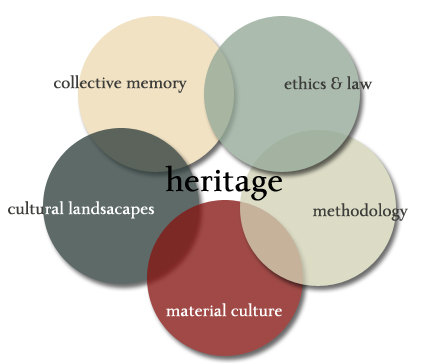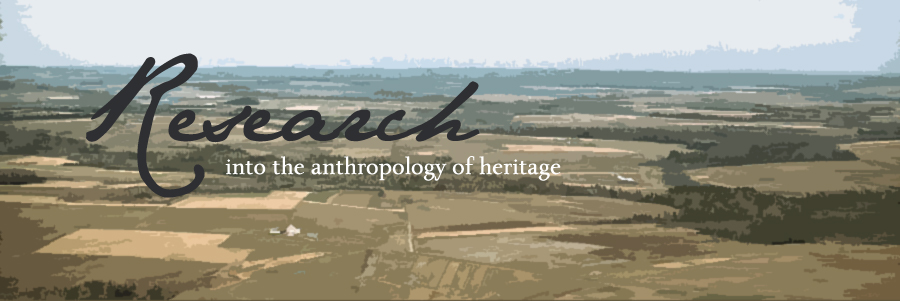Topics that capture my imagination
My academic career has spanned several disciplines including archaeology, anthropology, art history, critical theory, history, legal studies, philosophy, and computer science. I've applied these different lenses to numerous research projects that integrate five main themes: ethics/law, methodology, material culture, cultural landscapes, and collective memory. Time and again I've been seduced by research studies that question how we think about the past in the present, and how that thinking shapes our future. In both my BA thesis and my PhD dissertation, I position heritage conservation practices as the focus of ethnographic inquiry.

As an anthropologist, I find that deep, qualitative research helps me best approach a critical assessment of cultural knowledge and practice. Like many anthropologists, I combine archival research with ethnographic interviews and relevant quantitative data. I also find visual and spatial dimensions of meaning highly relevant to memory- and landscape-making practices and try to include these sources where possible. Finally, since the classification and structural representation of what are typically unproblematized data has been of interest to me, some of my research projects have included databases, knowledge domain models, and related media.
As a matter of personal ethics, I try to position my research interests in the form of an applied problem (i.e. having practicable results of real use to real people). My commitment to applied research helps to bring my research out of the clouds and to make me accountable beyond the academy. I try to work collaboratively with research participants and have been inspired by thinking more deeply about the virtue ethics of Baier and others. I position trust and vulnerability as central tenets of moral consideration.
Current Research
Entrusting the Commons:
Agricultural Land Conservation as a Tool for Cultivating Shared Heritage
Ph.D. Dissertation Prospectus Summary
The start of the twenty-first century is marked by new levels of globalization, environmental degradation, and social conflict. In the wake of these changes, heritage professionals are imagining new, holistic models for cultural and natural heritage protection. Many of these models are marked by active community engagement, referred to as “shared heritage” (Natsheh et al. 2008). The safeguarding of agricultural land offers fertile ground for a shared heritage model because it bridges the perceived gap between nature and culture that has historically divided heritage protection strategies, and it challenges advocates to consider how to protect working cultural landscapes. However, U.S. private property law poses a major challenge to a democratic mode of shared agricultural heritage protection: it grants exclusive rights to some to decide whose and what heritage to protect and how. Yet the fastest growing strategy for agricultural heritage protection in the U.S. is private land acquisition. Paradoxically, the private property regime poses a major challenge and a possible solution for safeguarding agricultural heritage.
In this dissertation, I argue that private land conservation provides a constructive tool for shared and sustainable agricultural heritage protection if it enables community members to engage with a social ethic of shared rights and responsibilities modeled on the commons. The case study for this research will be a rural town in New England, whose citizens are actively engaged in protecting their agricultural landscape. By studying the property relations of agricultural land conservation, the plural values citizens hold with regard to their rural heritage, and the cultural landscapes inscribed through citizens’ engagement with their environment, I ask: how can such communities maximize the benefits and mitigate the negative impacts of private land conservation as a tool for cultivating shared agricultural heritage? Situated as applied anthropology, my work will provide and support a forum for policymakers, agricultural heritage advocates, and community members in the town to engage in these issues and manifest their stakes in the process of social and economic development and the related negotiation of property relations.
Referenced Natsheh, Yusuf, Michael Turner, Khaled Naasar, Elizabeth Koch, and Neil Asher Silberman. 2008. PUSH Project Site Manual: Irtas. November. http://www.pushproject.org/publications/site%20manuals/assets/Irtas%20English.pdf.
